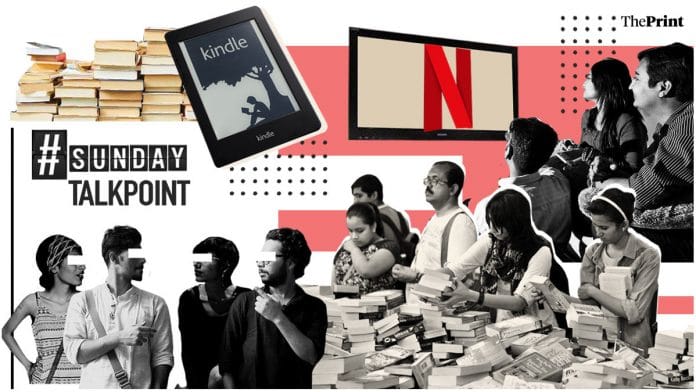The 28th edition of the New Delhi World Book Fair commenced Saturday at Pragati Maidan. The nine-day event will host 600 exhibitors from 23 countries. This year’s theme is ‘Gandhi: The Writers’ Writer’. The book fair was launched in 1972 and registered a footfall of 12 lakh people in 2019.
ThePrint asks: Delhi book fair: Is it still a crowd-puller in the age of Kindle and Netflix?
No one wants to invest a day in reading a book anymore when they have Netflix, audiobooks and podcasts
 Srijan Shukla
Srijan Shukla
Reporter, ThePrint
The Delhi World Book Fair may end up attracting a large number of people, not because more people want to read books, but because book fairs are now an ‘exotic’ thing and it has become ‘cool’ to visit one today.
When one looks at global book sales, they have broadly remained flat over the past decade. As opposed to popular perception, audiobooks have hurt book sales more than e-books. What explains this?
Netflix and other streaming platforms have induced a major path dependency. Most individuals know that reading a book is a smarter choice than binging on F.R.I.E.N.D.S and Brooklyn Nine-Nine. But after nine hours at work, it is just easier to binge on mindless web series than read the Iliad.
And while we have an acute sense of the kind of cognitive and intellectual value addition reading a book brings, the path dependency is so strong that we tend to go back to Netflix. But due to the fact that we recognise the value of books, the global podcast and audiobook industry is seeing a boom of sorts.
The other factor affecting book sales may be social media. In 2020, while no one wants to invest a day reading a book, they want to know everything about it. Everyone wants sharp intellectual insights, but in a bite-sized format. How do you get that?
You go to a literature festival today and listen to a writer talk about her book in a 30-minute panel discussion. In 2020, literature festivals are the new book fairs. And because most authors realise that, they often begin their discussions by saying: “this lecture is not a supplement for the book, go read the real thing”.
Book fairs — in both Kolkata and Delhi — have survived Netflix, Kindle and cable TV, and are a must-go
 Neera Majumdar
Neera Majumdar
Senior copy editor, ThePrint
Kindle was launched in 2007, Netflix was launched in India in 2016. Cable TV was available to us since the 1991 liberalisation reforms. And book fairs — in Delhi or Kolkata — have survived it, and continued to be an attraction for bibliophiles (and people looking for an ‘outing’, as they say).
I plan to go to the Delhi Book Fair this year, but growing up, the Kolkata Book Fair was a must-go annual event. And it wasn’t just when we were children — people of all ages, manners and political leanings showed up. It sees a footfall of almost 25 lakh each year and is a treasure trove for book lovers. And for students, it’s a cheap thrill. Some of the best books, and rare editions, can be found in those all-you-can-buy-for-Rs 500 piles.
I found a beautiful picture book on Gustav Klimt, a hilarious book called Do Ants Have Assholes? And 106 of the World’s Other Most Important Questions, a hardbound French Women Don’t Get Fat Cookbook, and the engrossing Dope Girls: The Birth of the British Underground Drug. All random finds that couldn’t have been offered to me by Amazon, Netflix or Kindle. Or predicted by my search algorithm (hopefully).
The Kolkata Book Fair is unique too — it’s not a trade fair, like the Frankfurt Book Fair. It’s a people’s fair. Each year, a country is the focal theme — last year it was Guatemala.
Book fairs carry a certain undeniable nostalgia — for instance, the Kolkata Book Fair has been woven into a part of Kolkata culture.
Going to Delhi World Book Fair has become a fad, people do it to look cool on social media
 Ekta Handa
Ekta Handa
Web editor, ThePrint
The Delhi World Book Fair is a much-awaited annual event. Hundreds of publishers from not just India but also across the world put up kiosks to showcase their new collection of books.
The event also sees writers gracing the event to address gatherings and market their books. All in all, a book fair is the perfect place for bibliophiles to explore new titles and interact with authors and publishers.
People from across Delhi flock to Pragati Maidan for the 9-day long fair, but most of them don’t visit it for their love of books. Going to the Delhi World Book Fair has become more of a fad much like attending Jashn-e-Rekhta (considered the world’s largest Urdu festival) or ‘Horn Ok Please’ (the food truck festival) held in Delhi every year. People go to the book fair less to buy books, check out the latest publications and more to hang out, click selfies and look cool on social media.
These book fairs are the next ‘cool’ thing where people can go and spend their evenings and weekends and also meet and interact with people from all walks of life. Nonetheless, the Delhi World Book Fair is a huge crowd-puller, which helps publishers and writers exhibit their wide range of work.
One wouldn’t want to go to a crowded fair, get pushed and jostled for a book easily available on phone
 Rama Lakshmi
Rama Lakshmi
Opinion editor, ThePrint
I used to go to the Delhi Book Fair when I was very young and was dragged by my father across town. I had little purchasing power back then. So, I just read what he bought for me.
When I became an earning adult, I chose the chic bookstore Fact & Fiction as my favourite haunt. I developed a relationship with the owners who would text me new book titles that they thought would interest me. Or every time I dropped in, they would point to a pile that they had assembled for me, based on my previous buys. They did what new age algorithm-based sites do today — selling based on predictive analytics. Of course, they also made small talk while I browsed.
Then came Amazon and Flipkart. Things just became easier, choice wider and purse lighter. I stopped going to the book store.
All this is to say that I haven’t stepped into a book fair in decades. Why would I want to travel across town on my precious weekend, go to a crowded area, get pushed and shoved in packed stalls and jostle for a book that I can easily find on my phone?
Most people at the book fair are not there to buy books anyway. They just want a place to visit on a winter weekend — when they are done strolling in the malls, India Gate and the Akshardham Temple.
Also read: In era of Chetan Bhagat, Netflix & Twitter celebrity, the undiscovered author has lost
By Kairvy Grewal, journalist at ThePrint







You should wait for the COVID to go away before holding next show
Nothing can beat the pleasure of holding a book in your hands.. “The real thing”
What a pathetic collection of two paragraph opinion pieces. I expected more in depth take on it. Mindlessly writing about something and publishing it on the web has become a fad and the cool thing it seems.
Never went to a book fair as such – just as I feel uncomfortable going to a Sale – but bought a few thousand books, managed to read quite a few of them. Strand Bookstall was a favourite. More recently, Oxford Bookstall, which has shut down. Wife told me, We can’t find space for your collection, so gave most of them to daughter’s J B Petit School library, where I hope they will be read with pleasure by many bright young girls. Have also never attended a Literature Festival. However, on both counts, feel happy that young people – also oldies like RR – still love books.
A person who has “bought a few thousand books” (not sure if read) certainly should know the difference between cut-and-paste and citation to support an argument. Lot to learn!!!
Ahh….the joy of holding and reading a hardback. My three kindles are languishing on the bookshelf.